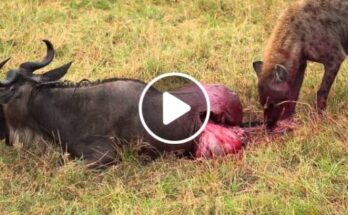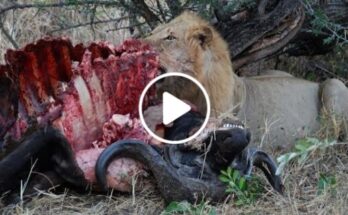In a heartwarming story of human kindness towards animals, a man recently rescued a dolphin that was on the brink of death. The man found the lifeless mammal washed up on the shore and immediately sprang into action to try and save it.
The dolphin was lying motionless on the beach, barely breathing and with no apparent signs of life. However, the man didn’t give up hope and started to administer first aid to the creature, performing CPR and trying to revive it.
After several minutes of effort, the man’s efforts finally paid off, and the dolphin started to show signs of life. It began to breathe on its own and slowly regain consciousness, much to the man’s relief and delight.

It is a gloomy morning in Walvis Bay, huge waves are crashing to the shore, and a group of tourists is exploring the hidden beauty and wonders of the place.
A kayaker is leading the guests along the beach in Namibia after their tour when he sees a mysterious lump of black from afar. It is a baby Benguela dolphin lying idly on the beach. Sensing the baby dolphin’s distress, he comes right away to its aid.
Heaviside’s dolphins are found in a limited section of African coastal waters. They have striking black, gray, and white markings and are sometimes mistaken for baby orcas when spotted at sea.

They were originally discovered off the South African coast by Captain Heaviside. That is why they are sometimes known by their original-intended name, which is Heaviside’s dolphins. However, a case of mistaken identity resulted in this dolphin being named after another captain, Mr. John Heaviside, instead.

Heaviside’s dolphins are small, blunt-headed, chunky dolphins with rounded paddle-shaped flippers and a large, triangular-shaped dorsal fin. Unlike most dolphins, they do not have a beak.
Despite the fact that the dolphin kind of looks like a baby killer whale, the tour guide bravely picks up the beached dolphin and carries it back to the water.
Naude Dreyer of Pelican Point Kayaking makes a quick assessment and takes measurements of the young cetacean. Although he is not sure how did it end up there, he suspects that the young animal is beaching.

At first, the young dolphin didn’t move as Naude dips its body on the sea. He continues to observe for few moments for any reaction. He decides to guide its body to drift along the water as the strong current splashes on its body.
Naude patiently glides the cetacean until it comes back to its senses. When the baby Heaviside’s dolphin notices where it is, it flips its tail in a swift motion. It was excited to go back to its natural habitat.

It is also its way of thanking Naude for saving its life from imminent danger. When it finally recovers its energy, it suddenly goes off like a bullet.

It swims fast against the tidal waves rushing back to where its family is. Naude stares as the dolphin disappears, relief washing over him that he saved the dolphin on time.
Although it is worth noting that many animal rescue organizations recommend not attempting to save or rescue animals alone, especially stranded animals like this dolphin.

They rather urge people to call authorities when they find one. It is because many animals beach themselves again after they are rescued. In Naude’s case, he kept an eye out for the little dolphin to make sure it doesn’t return.
Be inspired by human kindness and check out this video.
Please SHARE this with your friends and family.


